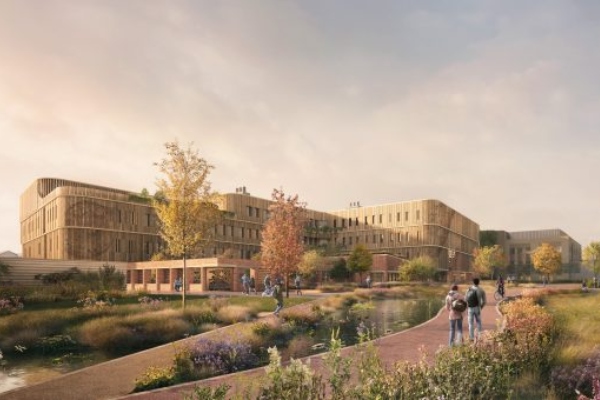UK Research and Innovation (UKRI) has announced a £481 million investment in major research and innovation infrastructure over the next three years.
This investment portfolio includes an outline of the John Innes Centre in Norwich and The Sainsbury Laboratory’s Next Generation Infrastructure (NGI) (Norwich), subject to business case approval.
The proposed funding of £54.7m into the centre over the next three years would transform existing capabilities via new and shared interdisciplinary research facilities, with a goal for the facility to be net-zero.
Professor Dale Sanders, director of the John Innes Centre said: “We’re delighted that UKRI has included plans to create cutting-edge new facilities at the John Innes Centre and The Sainsbury Laboratory within the UKRI Infrastructure Fund allocation. Although the investment is still subject to business case approval, we warmly welcome its inclusion in the budget allocation.
“Securing this funding will be a major step forward for our ambitious plans to create a world-leading hub for plant and microbial sciences in Norwich to tackle major global challenges of climate change, net-zero agriculture, food security and human health.”
Professor Nick Talbot FRS, executive director of The Sainsbury Laboratory, said: “We’re very excited by the UKRI budget allocation for our proposed hub for plant and microbial science to deliver the HP3 vision. This shows confidence in the future of our research institutes and their ability to transform global agriculture through innovation.
“In the face of the climate emergency, it is imperative that agricultural production is transformed to become a net carbon zero activity that no longer relies on fossil fuels. The proposed investment will allow us to harness the collaborative environment on the Norwich Research Park, catalysing new research initiatives and creating a unique asset for UK science.”
The investment would enable a step-change in the capability to address research challenges including furthering genetic crop improvement strategies, reducing agricultural greenhouse gas emissions through soil and plant health and understanding plant-microbe interactions to develop clinical treatments to improve human health.
UKRI have outlined funding for NGI of £54.7m over the next three years and £317.7m from the Infrastructure Fund in total including future funding years, the funding is subject to business case approvals.
The John Innes Centre and The Sainsbury Laboratory in Norwich are internationally recognised centres of excellence in plant and microbial science. The proposed investment would transform the existing capabilities of both centres via new and shared interdisciplinary research facilities with a goal for the facility to be near net-zero.
UKRI chief executive Professor Dame Ottoline Leyser said: “The UK is home to world-renowned facilities in a wide range of fields, which act as global hubs for research and innovation. We must ensure that we renew and upgrade that capability to keep pace with technological advances, empowering our researchers and innovators to go further faster.
“Today, we are investing £481 million across the UK that will ensure our talented people, teams and innovative businesses have access to the world-class infrastructure they need to unlock their full potential.”
The three-year £481 million investment is made from UKRI’s Infrastructure Fund. The lifetime UKRI Infrastructure Fund investment in this portfolio is estimated to be £1.6 billion.
Many of the investments, including the JIC/TSL Next Generation Infrastructure programme will be subject to business case and further approvals.
Image: BDP
© Eastern Echo (powered by ukpropertyforums.com).
Sign up to receive your free bi-weekly Eastern Echo journal here.











